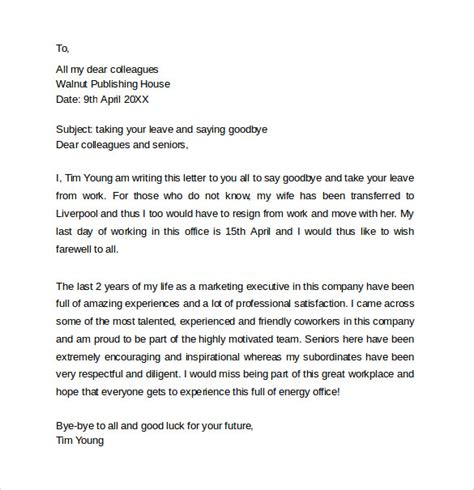Saying Goodbye To Colleagues: Farewell Letter Examples In English

Saying goodbye to colleagues can be a bittersweet experience. Whether you’re leaving a job or a team member is moving on, it’s important to show appreciation and leave on a positive note. A farewell letter is a great way to express your gratitude, share memories, and wish your coworkers the best. In this post, we’ll provide examples of farewell letters and tips for writing your own.
Why Writing a Farewell Letter is Important
Leaving a job or a team can be an emotional experience. Writing a farewell letter can help you express your feelings and leave on a positive note. Here are a few reasons why writing a farewell letter is important:
- Express gratitude: A farewell letter is a great opportunity to thank your colleagues for their support and contributions.
- Share memories: Writing about shared experiences and memories can help you leave on a positive note.
- Stay connected: A farewell letter can help you stay in touch with your colleagues and maintain relationships.
Tips for Writing a Farewell Letter
Writing a farewell letter can be challenging. Here are a few tips to help you write a heartfelt and memorable farewell letter:
1. Start with a personal greeting
Begin your letter with a personal greeting, such as “Dear [Name]” or “Hello [Team].” This will help you establish a warm and friendly tone.
2. Express gratitude
Express your gratitude for your colleagues’ support, guidance, and contributions. Be specific about how they have impacted your work and your life.
Share your favorite memories and experiences with your colleagues. This can help you leave on a positive note and create a lasting impression.
4. Wish them well
Wish your colleagues well in their future endeavors. Let them know that you believe in their abilities and are excited to see what the future holds.
5. Keep it positive
A farewell letter is not the place to air grievances or express negativity. Keep your letter positive and focus on the good times and memories you’ve shared.
6. Keep it brief
Your farewell letter should be heartfelt, but it doesn’t need to be lengthy. Keep it brief and to the point.
7. Edit and proofread
Before sending your letter, make sure to edit and proofread it carefully. Check for spelling and grammar errors, and make sure your message is clear and concise.
Examples of Farewell Letters
Example 1: Leaving a Job
Dear [Manager’s Name],
I wanted to take a moment to express my gratitude for the time I’ve spent working at [Company Name]. It’s been an incredible journey, and I feel fortunate to have had the opportunity to work with such a talented and supportive team.
During my time here, I’ve learned so much and grown both personally and professionally. I’m grateful for the challenges and opportunities that have come my way, and for the guidance and mentorship you’ve provided.
Although I’m sad to be leaving, I’m excited for the next chapter in my career. I know that the skills and experiences I’ve gained here will serve me well in the future.
Thank you for everything, and I look forward to staying in touch.
Best regards,
[Your Name]
Example 2: Saying Goodbye to a Team Member
Hello [Team],
It’s with a heavy heart that I say goodbye to this incredible team. I’ve had the privilege of working alongside some of the most talented and dedicated individuals I’ve ever met, and I feel lucky to have been a part of this team.
During my time here, I’ve learned so much and grown both personally and professionally. I’m grateful for the memories we’ve shared and the relationships we’ve built.
Although I’m sad to be leaving, I’m excited for the next chapter in my life. I know that the skills and experiences I’ve gained here will serve me well in the future.
Thank you for everything, and I look forward to staying in touch.
Best regards,
[Your Name]
Conclusion
A farewell letter is a great way to express your gratitude, share memories, and wish your colleagues the best. Whether you’re leaving a job or a team member is moving on, take the time to write a heartfelt and memorable farewell letter. Use our tips and examples to help you get started.
FAQs
What should I include in a farewell letter?
A farewell letter should express your gratitude, share memories, and wish your colleagues the best. Be specific about how your colleagues have impacted your work and your life, and focus on the positive experiences you’ve shared.
When should I send a farewell letter?
You should send a farewell letter before you leave your job or your team member moves on. This will give you enough time to express your gratitude and share your memories.
How should I format my farewell letter?
Your farewell letter should be formatted like a professional letter, with a personal greeting, body, and closing. Use a clear and concise writing style, and keep your letter brief and to the point.
